- Home
- Hunter S. Thompson
The Rum Diary Page 11
The Rum Diary Read online
Page 11
I laughed again. “You may be right. Now why don't you tell me what you have in mind. I'm in a hurry.”
“One of these days,” he said, “this silly arrogance of yours is going to cost you a lot of money.”
“Goddamnit,” I replied, “I didn't come here to be analyzed.”
He smiled stiffly. “All right. The Times wants a general article for their spring travel section. Mrs. Ludwig will get some material together for you -- I'll tell her what you need.”
“What do they want?” I said. “A thousand happy words?”
“More or less,” he replied. “We'll handle the photos.”
“Okay,” I said. “That's a back-breaker -- now what about Zimburger?”
“Well,” he said. “Mister Zimburger wants a brochure. He's building a marina on Vieques island, between here and St. Thomas. We'll get the photos and do the layout -- you write the text, about fifteen hundred words.”
“What will he pay?” I asked.
“He won't,” Sanderson replied. “He'll pay us a flat fee -- we'll pay you twenty-five dollars a day, plus expenses. You'll have to make a trip to Vieques, probably with Zimburger.”
“Jesus,” I said.
He smiled. “No real hurry. Let's say next Friday.”
“The brochure will be aimed at investors,” he added. “This is one hell of a big marina -- two hotels, a hundred cottages, the whole works.”
“Where did Zimburger get his money?” I asked.
He shook his head. “It's not just Zimburger. He has several people with him on this -- as a matter of fact, he asked me in on it.”
“What stopped you?”
He swung around to face the window again. “I'm not ready to retire yet. This is a pretty interesting place to work.”
“I'll bet it is,” I said. “What's your cut here -- ten percent of every dollar invested on the island?”
He grinned. “You think like a mercenary, Paul. We're here to help, to keep the wheels turning.”
I got up to go. “I'll come by tomorrow and pick up the stuff.”
“How about lunch?” he said, looking at his watch. “It's about that time.”
“Sorry,” I said. “I have to run.”
He smiled. “Late for work?”
“That's right,” I said. “I have to get back and work on an expose.”
“Don't let your boy scout ethics run away with you,” he said, still smiling. “Oh yes -- while we're on the subject of scouts, tell your friend Yeamon to stop by when he gets a chance. I have something for him.”
I nodded. “Put him to work with Zimburger. They'd get along fine.”
When I got back to the office Sala called me over to his desk and showed me a copy of El Diario. On the front page was a picture of the three of us. I hardly recognized myself -- slit-eyed, sneaky-looking, hunched on the bench like a hardened criminal. Sala looked drunk and Yeamon looked like a maniac.
“When did they get this?” I said.
“I don't remember,” he replied. “But they damn well got it.”
Underneath the photo was a small story. “What's it say?” I asked.
“Same thing the cop said,” he replied. “We'll be lucky if we aren't lynched.”
“Has Lotterman said anything?”
“He's still in Ponce.”
I was beginning to get the fear. “You better carry a gun,” Moberg advised me. “They'll be after you now. I know those swine -- they'll try to kill you.” By six o'clock I was so depressed that I gave up trying to work, and went to Al's.
Just as I turned onto Calle O'Leary I heard Yeamon's scooter approaching from the opposite direction. It made a hellish sound in those narrow streets and you could hear it six blocks away. We arrived in front of Al's at the same time. Chenault was riding on the back, and she hopped off while he cut the engine. They both seemed drunk. On the way back to the patio we ordered hamburgers and rum.
“Things are getting worse,” I said, pulling up a chair for Chenault.
Yeamon scowled. “That bastard Lotterman dodged the hearing today. It was a hell of a thing -- those people at the Labor Department saw our picture in El Diario. I'm sort of glad Lotterman didn't show. He might have won today.”
“No wonder,” I said. “That was a very ugly photograph.” I shook my head. “Lotterman's in Ponce -- we're lucky.”
“Damnit,” he said. “I need that money this weekend. We're going over to St. Thomas for the carnival.”
“Oh yeah,” I said. “I've heard about that -- it's supposed to be pretty wild.”
“I've heard it's wonderful!” Chenault exclaimed. “It's supposed to be as good as the one in Trinidad.”
“Why don't you come with us?” Yeamon suggested. “Tell Lotterman you want to do the story.”
“I'd like to,” I said. “San Juan is driving me nuts.”
Yeamon started to say something, but Chenault cut him off. “What time is it?” she said anxiously.
I looked at my watch. “Almost seven.”
She quickly stood up. “I have to go -- it starts at seven.” She picked up her purse and started toward the door. “I'll be back in an hour,” she called. “Don't get too drunk.”
I looked at Yeamon.
“There's some kind of a ceremony going on at the big cathedral,” he said wearily. “God only knows what it is, but she has to see it.”
I smiled and shook my head.
He nodded. “Yeah, it's hell. I'm damned if I know what to do with her.”
“Do with her?” I said.
“Yeah, I've about decided this place is rotten to the core and I should get out.”
“Oh,” I said. “That reminds me. Sanderson has some kind of work for you -- writing travel articles. His integrity demands that he justify what he said about us the other night.”
He groaned. “Christ, travel articles. How low can a man fall?”
“Figure that out with Sanderson,” I said. “He wants you to call him.”
He leaned back and stared at the wall, saying nothing for several moments. “His integrity,” he said finally, as if he'd been dissecting the word. “It seems to me that a guy like Sanderson has about as much integrity as a Judas Goat.”
I sipped my drink.
“What makes you deal with a guy like that?” he asked. “You're always going over there -- is there something to him that I can't see?”
“I don't know,” I said. “What do you see?”
“Not much,” he replied. “I know what Sala says -- he claims he's queer -- and of course he's a phony and a prick and God knows what else.” He paused. “But Sala just tosses words around: Phony, Prick, Queer -- so what? I'm curious as to what the hell you see in the guy.”
Now I understood Sala's crack at breakfast the other day. And I felt that whatever I said about Sanderson now would be crucial -- not for Sanderson, but for me. Because I knew why I dealt with him and most of my reasons were pretty small -- he was in and I was out, and he looked like a pretty good pipeline to a lot of things I wanted. On the other hand, there was something about him that I liked. Perhaps it was Sanderson's struggle with himself that fascinated me -- the hardnose man of the world, gradually blotting out the boy from Kansas. I remembered him telling me that the Hal Sanderson from Kansas had died when his train got to New York -- and any man who can say a thing like that, and attempt to say it with pride, is worth listening to unless you have something a hell of a lot better to do with your time.
Yeamon's voice snapped me out of my pondering. “Okay,” he said with a wave of his hand, “if you give it that much thought there's bound to be something to it, but I still think he's rotten.”
“You think too much,” I said.
“Got to think all the time,” he muttered. “That's my trouble -- I take vacations from thinking.” He nodded. “It works out the same way as all the other vacations -- you relax for two weeks, then spend fifty weeks making up for it.”
“I don't quite follow you,” I said.
/> He smiled. “You interrupted me. We were talking about Chenault -- and all of a sudden you brought up the Judas Goat.”
“Okay,” I said. “What about her? Is this your way of saying you're going to leave her with me?”
He tapped the table with his fingers. “Kemp, I'd rather you wouldn't say things like that. I'm pretty square when it comes to trading girls around, especially a girl I like.” He said it calmly, but I could hear the edge in his voice.
I shook my head. “You're an inconsistent bastard -- that's the last thing I'd expect to hear from you.”
“I'm not much on consistency,” he said, talking easily again. “No, I was just thinking out loud -- I don't do that very often.”
“I know,” I said.
He sipped his drink. “I spent all day yesterday thinking,” he said. “I should leave this place, and I don't know what to do about Chenault.”
“Where do you figure on going?” I asked.
He shrugged. “I don't know -- maybe down the islands, maybe Europe.”
“Europe's not bad,” I said. “If you have a job.”
“I won't,” he said.
“No,” I agreed. “You probably won't.”
“That's what I was thinking about,” he said. “And I wondered why the hell I wanted to go to Europe, anyway -- why should I?”
I shrugged. “Why not?”
“You know,” said Yeamon, “I haven't been home in three years, but the last time I was there, I spent a lot of time in the woods.”
“You're losing me again,” I said. “I don't even know where you're from.”
“A place called London, Kentucky,” he said. “Laurel County -- a fine place to disappear.”
“You planning on disappearing?” I asked.
He nodded. “Could be. Not in Laurel County, though.” He paused. “My father decided to play games with his money, and we lost the farm.”
I lit a cigarette.
“It was a fine place,” he said. “A man could go out there and shoot all day and run his dogs and raise all manner of hell, and not a soul in the world would bother him.”
“Yeah,” I said. “I did some hunting around St. Louis.”
He leaned back and stared into his drink. “I got to thinking about that yesterday, and it gave me the idea that I might be on the wrong track.”
“How's that?” I said.
“I'm not sure,” he replied. “But I have a feeling that I'm following a course that somebody laid out a long time ago -- and I have one hell of a lot of company.”
I looked up at the plantain tree and let him go on.
“You're the same way,” he said. “We're all going to the same damn places, doing the same damn things people have been doing for fifty years, and we keep waiting for something to happen.” He looked up. “You know -- I'm a rebel, I took off -- now where's my reward?”
“You fool,” I said. “There is no reward and there never was.”
“Jesus,” he said. “That's horrible.” He raised the bottle to his lips and finished it off. “We're just drunkards,” he said, “helpless drunkards. To hell with it -- I'll go back to some Godforsaken little town and be a fireman.”
I laughed, and just then Chenault came back. We sat in the patio and drank for several hours until Yeamon stood up and said they were going home. “Think about that St. Thomas thing,” he said. “We might as well play the game while we can.”
“Why not?” I muttered. “I'll probably go. Might be the last fun I'll have.”
Chenault waved goodbye and followed Yeamon out to the street.
I sat there for a while, but it was too depressing. Between Yeamon's talk and my picture in El Diario, I was beginning to feel suicidal. My skin felt creepy and I began to wonder if maybe all this drinking was getting the best of me. Then I remembered a story the News had run last week about an epidemic of parasites in the local water supply, little worms that destroy the intestines. Jesus, I thought, I better get out of here. I paid my tab and bolted out to the street and looked up and down, wondering where I could go. I was afraid to walk, for fear of being recognized and beaten by an angry mob -- but the thought of going home to the nest of fleas and poison crab lice I had been sleeping in for three months filled me with terror. Finally, I took a cab to the Caribe Hilton. I sat at the bar for an hour or so, hoping to meet a girl who'd invite me up to her room, but the only person I met was a football coach from Atlanta who wanted me to walk on the beach. I told him I would, but first I had to borrow a meat-whip from the kitchen.
“What for?” he asked.
I stared at him. “Don't you want to be flogged?”
He laughed nervously.
“You wait here,” I said. “I'll get the whip.” I got up and went to the restroom, and when I returned he was gone.
There were no girls in the bar -- only middle-aged women and bald men in dinner jackets. I was shaking. Jesus, I thought, maybe I'm getting the DTs. I drank as fast as I could, trying to get drunk. More and more people seemed to be staring at me. But I couldn't speak. I felt lonely and exposed. I stumbled out to the street and flagged a cab. I was too crazed to check into a hotel. There was no place to go but that filthy roach-infested apartment. It was the only home I had.
I turned on the lights and opened the windows, then I made a large drink and stretched out on the cot to read my magazine. There was a faint breeze, but the noise from the street was so terrible that I gave up trying to read and turned out the lights. People kept passing on the sidewalk and looking in, and now that they couldn't see me I expected looters to come crawling through the window at any moment I lay back on the cot with a bottle of rum resting on my navel and plotted how to defend myself.
If I had a Luger, I thought, I could drill the bastards. I leaned on one elbow and pointed a finger at the window, seeing what kind of a shot I would get. Perfect. There was just enough light in the street for a good silhouette. I knew it would happen quickly, I'd have no choice: just pull the trigger and go deaf from the terrible noise, a frenzy of screaming and scratching followed by the ghastly thump of a body knocked back and down to the sidewalk. There would be a mob, of course, and I'd probably have to shoot a few in self-defense. Then the cops would arrive and that would be it. They'd recognize me and probably kill me right there in the apartment.
Jesus, I thought, I'm doomed. I'll never get out of here alive.
I thought I saw things moving on the ceiling and voices in the alley were calling my name. I began to tremble and sweat, and then I fell into a twisted delirium.
The Rum Diary
Eleven
That night finished me with Sala's tomb. The next morning I got up early and went out to Condado to seek an apartment I wanted sunlight and clean sheets and a refrigerator where I could keep beer and orange juice, food in the pantry and books on the shelves so I could stay home once in a while, a breeze coming in through the window and a peaceful street outside, an address that sounded human-instead of c/o or Gen. Del. or Please Forward or Hold for Arrival.
A ten-year accumulation of these vagrant addresses can weigh on a man like a hex. He begins to feel like the Wandering Jew. That's the way I felt. After one night too many sleeping on some stinking cot in a foul grotto where I didn't want to be anyway and had no reason to be except that it was foreign and cheap, I decided to hell with it. If that was absolute freedom then I'd had a bellyful of it, and from here on in I would try something a little less pure and one hell of a lot more comfortable. I was not only going to have an address, but I was going to have a car, and if there was anything else to be had in the way of large and stabilizing influences, I would have those too.
There were several apartments advertised in the paper, but the first few I looked at were too expensive. Finally I found one over somebody's garage. It was just what I wanted -- plenty of air, a big flamboyan tree for shade, bamboo furniture and a new refrigerator.
The woman wanted a hundred, but when I said seventy-five she quickly agreed. I had seen
a big “51” sticker on a car in front of her house and she told me that she and her husband were going all out for statehood. They owned La Bomba Cafe in San Juan. Did I know it? Indeed I did -- knew it well, ate there often, incomparable food for the price. I told her I worked for the New York Times and would be in San Juan for a year, writing a series of stories about statehood for Puerto Rico. For this, I would need absolute privacy.
We grinned at each other and I gave her a month's rent in advance. When she asked for another seventy-five on deposit I told her I'd get my expense check next week and would pay her then. She smiled graciously and I left before she could dun me for anything else.
Knowing I had a place of my own cheered me immensely. Even if I was fired I had enough in the bank to rest for a while, and with Sanderson shelling out twenty-five bills a day I would have no worries at all.
I walked out to Avenida Ashford and took a bus to the office. Halfway there, I remembered that this was my day off, but I wanted to check my mail so I went in. As I crossed the newsroom toward the mail slots, Sala called me from the darkroom.
“Man,” he said, “you should have been here earlier. Lotterman found out about Moberg signing that check for our bail-tried to croak him with a pair of scissors, chased him all the way down to the street.” He nodded. “It was hell. I thought Moberg was a goner.”
“Good God,” I muttered. “What about the check -- is it still good?”
“I guess so,” he replied. “He'll lose face if it bounces.”
I nodded doubtfully. This screwed my plan to get a car. I was going to borrow money from Lotterman and pay it back out of my salary at ten or fifteen a week. I was standing there by the darkroom, racking my brain for alternatives, when Lotterman popped out of his office and called me.
“I want to see you,” he barked. “You too, Sala -- don't try to duck back in there.”
Sala ignored him and went into the darkroom. Seconds later he appeared with a pack of cigarettes. “Duck, hell!” he snorted, loud enough for Lotterman and everybody else to hear. “The day I have to duck a punk like that I'll toss in the towel.”

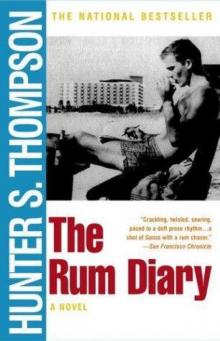 The Rum Diary
The Rum Diary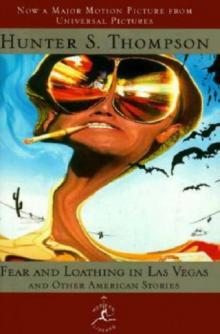 Fear and Loathing in Las Vegas and Other American Stories
Fear and Loathing in Las Vegas and Other American Stories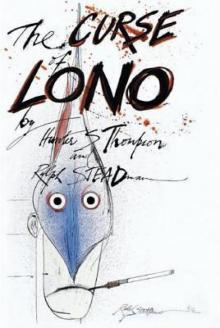 The Curse of Lono
The Curse of Lono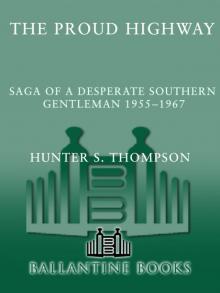 Proud Highway: Saga of a Desperate Southern Gentleman, 1955-1967
Proud Highway: Saga of a Desperate Southern Gentleman, 1955-1967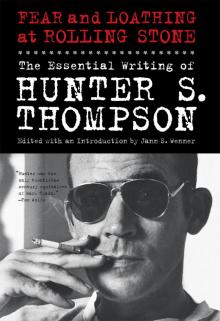 Fear and Loathing at Rolling Stone: The Essential Hunter S. Thompson
Fear and Loathing at Rolling Stone: The Essential Hunter S. Thompson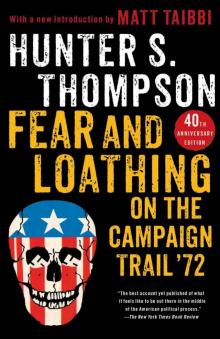 Fear and Loathing on the Campaign Trail '72
Fear and Loathing on the Campaign Trail '72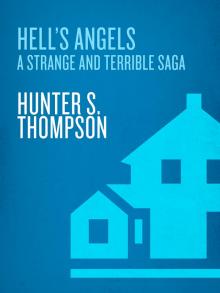 Hell's Angels: A Strange and Terrible Saga
Hell's Angels: A Strange and Terrible Saga The Great Shark Hunt: Strange Tales From a Strange Time
The Great Shark Hunt: Strange Tales From a Strange Time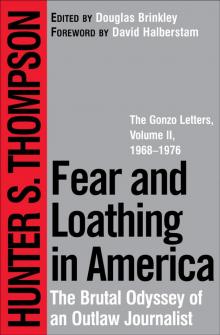 Fear and Loathing in America
Fear and Loathing in America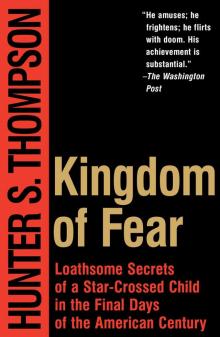 Kingdom of Fear
Kingdom of Fear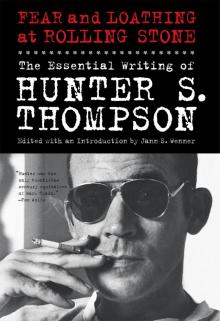 Fear and Loathing at Rolling Stone
Fear and Loathing at Rolling Stone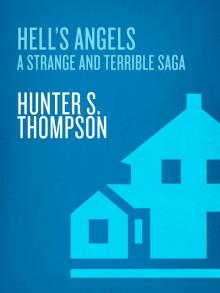 Hell's Angels
Hell's Angels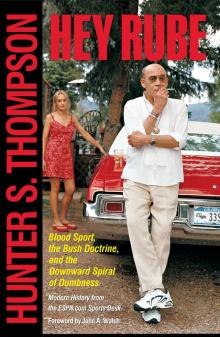 Hey Rube
Hey Rube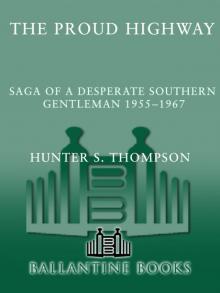 Proud Highway
Proud Highway